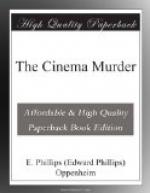No news of Douglas Romilly.
The police have been unable to discover any trace of the missing Englishman. From further cables to hand, it appears that he was in possession of a considerable sum of money, which must have been on his person at the time of disappearance, and it is alleged that there was also a large amount, with which he had intended to make purchases for his business, standing to his credit at a New York bank. Nothing has since been discovered, however, amongst his belongings, of the slightest financial value, nor does any bank in New York admit holding a credit on behalf of the missing man.
“Perhaps it is time,” Philip murmured, “that these were destroyed.”
He tore the newspapers into pieces and threw them into his waste-basket. On his writing-table were forty or fifty closely written pages of manuscript. In his pocketbook were sixteen hundred dollars, and a document indicating a credit for a very much larger amount at the United Bank of New York, in favor of Merton Ware and another. The remainder of his belongings were negligible. He stood at the window and looked out across the city, the city into whose labyrinths he was so eager to penetrate—the undiscovered country. By day and night its voices were in his ears, the rattle and roar of the overhead railway, the clanging of the street cars, the heavy traffic, the fainter but never ceasing foot-fall of the multitudes. He had sat there before dawn and watched the queer, pinky-white light steal with ever widening fingers through the darkness, heard the yawn of the city as it seemed to shiver and tremble before the battle of the day. At twilight he had watched the lights spring up one by one, at first like pin pricks in the distance, growing and widening until the grotesque shapes of the buildings from which they sprung had faded into nothingness, and there was left only a velvet curtain of strangely-lit stars. At a giddy distance below he could trace the blaze of Broadway, the blue lights flashing from the electric wires as the cable cars rushed back and forth, the red and violet glimmer of the sky signs. He knew it all so well, by morning, by noon and night; in rainstorm, storms which he had watched come up from oceanwards in drifting clouds of vapour; and in sunshine, clear, brilliant sunshine, a little hard and austere, to his way of thinking, and unseasonable.
“A week,” he muttered. “She said a week. Tonight I will go out.”
He looked at himself in the glass. He wore no longer the well-cut clothes of Mr. Douglas Romilly’s Saville Row tailor, but a ready-made suit of Schmitt & Mayer’s business reach-me-downs, an American felt hat and square-toed shoes.
“She said a week,” he repeated. “It’s a fortnight to-day. I’ll go to the restaurant at the corner. I must find out for myself what all this noise means, what the city has to say.”
He turned towards the door and then stopped short. For almost the first time since he had taken up his quarters here, the lift had stopped outside. There was a brief pause, then his bell rang. For a moment Philip hesitated. Then he stepped forward and opened the door, looking out enquiringly at his caller.




